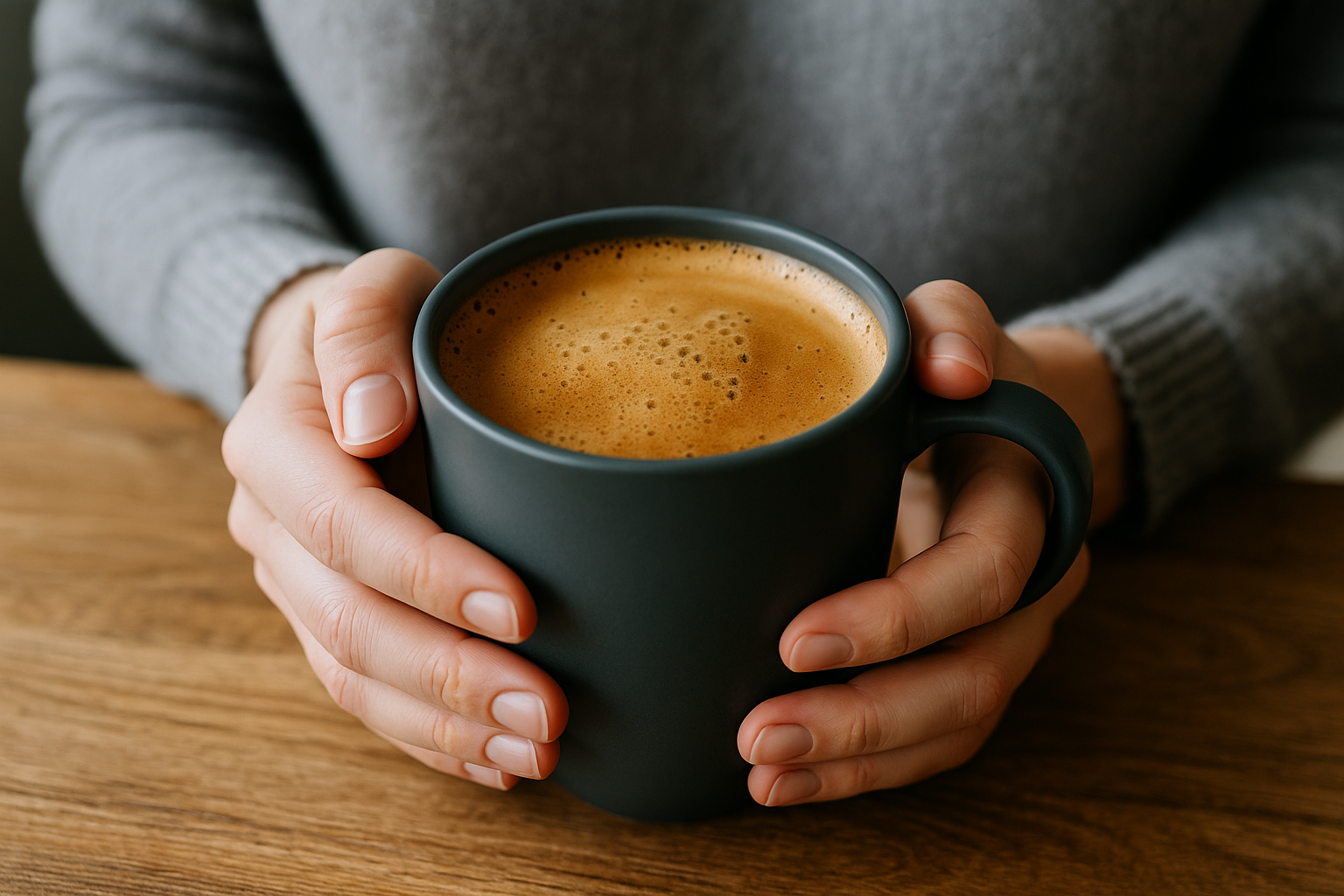There’s a reason so many people around the world begin their day with a cup of coffee. More than just a routine, that first sip delivers a warm sense of focus, alertness, and energy that helps set the tone for a productive day.
Coffee, when enjoyed in moderation and with intention, can be one of the simplest and most effective tools for naturally enhancing morning energy. But why does it work so well, and how can you make the most of its benefits without going overboard?
In this article, we’ll explore how coffee supports your energy levels, how to avoid common mistakes, and how to make coffee part of a balanced and energizing morning ritual.
The Role of Caffeine in Mental and Physical Energy
Caffeine is a natural stimulant found in coffee beans. It works by blocking adenosine, a chemical in the brain that promotes sleepiness. When adenosine is blocked, you feel more awake, alert, and ready to take action.
This process also increases the production of other neurotransmitters like dopamine and norepinephrine, which contribute to improved mood and focus. That’s why caffeine not only wakes you up but can also enhance mental clarity and motivation.
Physically, caffeine helps your body release stored energy, slightly increasing your heart rate and preparing your muscles for movement. It’s no wonder that coffee is also a popular pre-workout beverage.
The Importance of Timing Your Coffee
The timing of your coffee can impact how effective it is at boosting your energy. Many people drink their coffee as soon as they wake up, but that may not be the most efficient approach.
Your body naturally produces high levels of cortisol (the “alertness” hormone) in the early morning hours, especially within 30 to 60 minutes of waking up. Drinking coffee during that cortisol peak can reduce the stimulating effects of caffeine over time and may lead to increased tolerance.
A smarter strategy is to wait about 60 to 90 minutes after waking up before drinking your coffee. This allows your natural energy cycle to function as it should, and lets caffeine enhance it instead of replace it.
Choosing the Right Coffee for Sustained Energy
Not all coffee is the same. The roast, grind size, and brewing method can all influence how your body responds.
Lighter roasts tend to have slightly more caffeine than darker ones. Brewing methods like espresso and pour-over typically produce stronger coffee than drip or French press.
If your goal is steady energy, avoid coffee drinks loaded with sugar or heavy cream, which can lead to a crash. Instead, go for black coffee, or add a splash of milk or plant-based alternatives if you prefer a smoother taste.
The quality of your coffee beans also matters. Freshly ground, high-quality beans tend to provide a cleaner flavor and better stimulation with fewer jitters.
Creating a Morning Coffee Ritual That Energizes
Drinking coffee should be more than just gulping caffeine—it can be a mindful moment to transition into the day.
Start by preparing your coffee with care. Grind your beans, use filtered water, and choose a brewing method you enjoy. This small act of intention sets a calming tone and helps wake up your senses.
While you sip your coffee, avoid diving straight into stressful tasks. Instead, take 10–15 minutes to journal, stretch, read, or simply sit by a window. Pairing coffee with a grounding habit helps regulate your energy and prevent spikes in stress or overstimulation.
This ritual becomes a signal to your body and mind: the day is starting, and you’re ready to meet it.
How Coffee Supports Mental Focus and Productivity
Many people report that coffee helps them feel more alert and mentally sharp. Caffeine has been shown to improve attention span, reaction time, and short-term memory.
This makes it an ideal companion for work, studying, or creative projects. However, the key is not to overdo it. Too much caffeine can lead to nervousness, restlessness, or difficulty focusing.
For most people, a moderate dose of caffeine—equivalent to one or two cups of coffee in the morning—is enough to reap the benefits without drawbacks.
It’s also helpful to pair your coffee with light activity or a simple to-do list. The boost in mental energy can be directed toward meaningful action instead of scrolling or multitasking.
Coffee and Mood Enhancement
Beyond energy, coffee can also lift your mood. Many coffee drinkers associate their morning cup with comfort, routine, and a moment of peace. These associations, combined with the dopamine boost from caffeine, contribute to a sense of well-being.
In fact, some studies suggest that moderate coffee consumption is linked with a more positive outlook and greater resilience in daily stress.
Of course, mood is influenced by many factors, and coffee is not a substitute for rest or self-care—but it can be a small daily support for feeling more balanced and motivated.
Hydration and Coffee: Can It Work Together?
One common myth is that coffee causes dehydration. While caffeine does have a mild diuretic effect, drinking coffee does not cancel out your daily hydration goals.
In fact, coffee counts toward your fluid intake. That said, it’s still important to drink water alongside your morning brew. A good habit is to drink a full glass of water when you wake up, then enjoy your coffee after breakfast.
Staying hydrated helps caffeine work more efficiently in your body and prevents fatigue or headaches later in the day.
Coffee and Movement: Fueling Light Morning Activity
If you enjoy light exercise in the morning—like yoga, walking, or stretching—coffee can be a helpful boost.
Caffeine increases alertness and blood flow, making it easier to get moving and stay consistent with your morning routine. It may also reduce perceived exertion, meaning you feel less tired while being active.
Enjoying a cup of coffee before or after a short movement session can help you feel energized and centered for the rest of the day.
Avoiding the Crash: Tips for Balanced Coffee Consumption
To enjoy the energy benefits of coffee without the crash, it’s important to avoid excess and monitor your intake.
Stick to one or two cups in the morning, and avoid drinking coffee late in the afternoon. This helps prevent sleep disturbances and keeps your energy cycle stable.
Avoid relying on coffee as your only energy source. Get enough sleep, eat balanced meals, and include light movement in your day to support your body’s natural rhythm.
If you notice jitteriness or anxiety after coffee, try switching to a lighter roast, reducing your portion size, or exploring low-caffeine blends.
Enhancing the Coffee Experience Without Extra Caffeine
You don’t need to drink more coffee to enjoy it more. Instead, focus on improving the experience.
Try different brewing methods to explore flavor nuances. Use high-quality beans from a region you haven’t tried before. Pair your coffee with fresh air or music you enjoy.
Some people find that drinking coffee in natural light—such as on a balcony or near a window—enhances its energizing effect and lifts the mood.
Creating a full sensory experience around coffee helps you enjoy it more deeply, with or without increasing your caffeine intake.
Making Coffee a Positive Part of Your Lifestyle
When enjoyed with awareness and moderation, coffee becomes more than a drink—it becomes a ritual, a focus tool, and a small but powerful act of self-care.
You don’t need to change your entire routine to benefit. A few mindful adjustments—like waiting an hour after waking up, skipping sugar, or pairing coffee with intention—can make all the difference.
Let your morning coffee work with your body, not against it. Support it with rest, hydration, good food, and movement. That way, you’ll feel energized naturally—not just caffeinated.
And remember: it’s not about drinking more coffee. It’s about drinking it better.

Marcelo Oliveira is a coffee enthusiast and content creator specializing in barista skills, brewing methods, equipment reviews, coffee-related health insights, and fascinating curiosities from the coffee world. With a deep passion for every step of the brewing process, he turns technical knowledge into accessible and engaging content for both beginners and seasoned coffee lovers. Marcelo’s goal is to help readers appreciate the full experience of coffee—from bean to cup.
